
| Info |
| Heroes |
| Tour Dates |
| Publications |
| Downloads |
| Open Access |
| Projects |
| Papers in Review |
| Vita |
| Editorial Boards |
| Contact |
| Mailing List |
 Terrorism: What Everyone Needs to Know
Terrorism: What Everyone Needs to Know
The purpose of the book is to educate and demystify terrorism and its myriad aspects for educated individuals that include college students, adult professionals, college-educated individuals, retired persons, and others, who seek a better knowledge about modern-day terrorism and counterterrorism. In a question-and-answer format, the book provides an informed viewpoint, free from ideology, of the concept of terrorism, the causes of terrorism, the effectiveness of counterterrorism, the asymmetries of terrorism, the role of terrorist groups, the economic consequences of terrorism, and the future of terrorism. There are a lot of misconceptions about terrorism that have been inadvertently generated by the news media or elected officials. These well-held misconceptions are identified and corrected, based on past research findings. Terrorists are viewed as rational actors who seek their political goals subject to their constraints. Their behavior is predictable. In a nontechnical fashion, game theory is shown to be an appropriate tool for explaining terrorist group behavior, the practice of counterterrorism, and the asymmetries of terrorism. The book is uses specific past terrorist attacks to illustrate the arguments. Clear references to support the arguments are given.
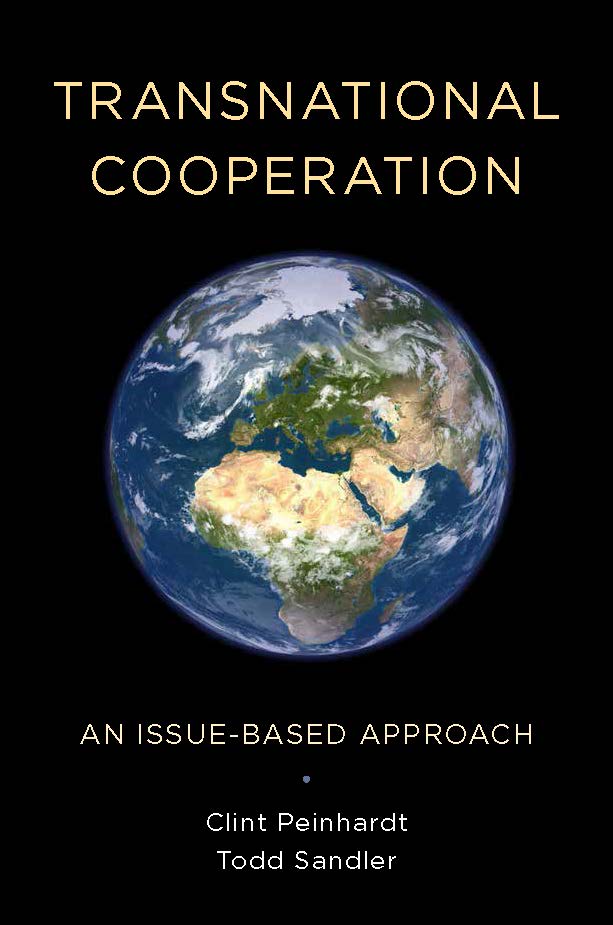 Transnational
Cooperation: An Issue-Based Approach
Transnational
Cooperation: An Issue-Based Approach
This book presents an analysis of transnational cooperation or collective
action that stresses basic concepts and intuition. Throughout the book,
we identify factors that facilitate and/or inhibit such cooperation.
We use elementary game theory as a tool for illustrating our ideas and
discussion. A unique feature of the book is its paired comparisons,
which are instructive in illustrating cooperation success and failure.
Throughout the book, we highlight the importance of institutions in
fostering transnational cooperation. Also, the role of technology is
recognized. The book is rich in applications and covers a wide range
of topics, including superbugs, civil wars, money laundering, financial
crises, drug trafficking, terrorism, global health concerns, international
trade liberalization, acid rain, leadership, sovereignty, and many others.
 The
Political Economy of Terrorism, 2nd ed.
The
Political Economy of Terrorism, 2nd ed.The Political Economy of Terrorism presents a widely accessible political economy approach to the study of terrorism. It applies economic methodology - theoretical and empirical - combined with political analysis and realities to the study of domestic and transnational terrorism. In so doing, the book provides both a qualitative and quantitative investigation of terrorism in a balanced up-to-date presentation that informs students, policymakers, researchers, and the general reader of the current state of knowledge. Included are historical aspects, a discussion of watershed events, the rise of modern-day terrorism, examination of current trends, the dilemma of liberal democracies, evaluation of counterterrorism, analysis of hostage incidents, and much more. Rational-actor models of terrorist and government behavior and game-theoretic analysis are presented for readers with no prior theoretical training. Where relevant, the authors display graphs using data from International Terrorism: Attributes of Terrorist Events (ITERATE), the Global Terrorism Database (GTD), and other public access data sets.
Handbook
of Defense Economics: Defense in a Globalized World, Vol. 2
The second volume of the Handbook
of Defense Economics addresses defense needs, practices, threats,
and policies in the modern era of globalization. This new era concerns
the enhanced cross-border flows of all kinds (e.g., capital and labor
flows, revolutionary rhetoric, guerrillas, and terrorists) including
the spillovers of benefits and costs associated with public goods and
transnational externalities (i.e., uncompensated interdependencies affecting
two or more nations). These ever-increasing flows mean that military
armaments and armies are less able to keep out security threats. Thus,
novel defense and security barriers are needed to protect borders that
are porous to terrorists, pollutants, political upheavals, and conflicts.
Even increased trade and financial flows imply novel security challenges
and defenses. Globalization also underscores the importance of a new
set of institutions (e.g., the European Union and global governance
networks) and agents (e.g., nongovernmental organizations and partnerships).
 The
Political Economy of Terrorism
The
Political Economy of Terrorism
The Political Economy of
Terrorism presents a widely accessible political economy approach
to the study of terrorism that combines economic methods with political
analysis and realities. It applies economic methodology - theoretical
and empirical - combined with political analysis to the study of domestic
and transnational terrorism. In so doing, the book provides both a qualitative
and quantitative investigation of terrorism in a balanced up-to-date
presentation that informs students, policymakers, researchers, and the
general reader of the current state of knowledge. Included are historical
aspects, a discussion of watershed events, the rise of modern-day terrorism,
examination of current trends, the dilemma of liberal democracies, evaluation
of counterterrorism, analysis of hostage incidents, and much more.
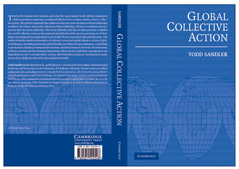 Global
Collective Action
Global
Collective Action
This book examines how nations
and other key participants in the global community address problems
requiring coordinated efforts of two or more entities, that is, collective
action. The global community has achieved successes on some issues such
as eradicating smallpox, but on others, such as the reduction of drug
trafficking, effots to coordinate nations' actions have not been sufficient.
This book identifies the factors that promote or inhibit successful
collective action at the regional and global level for an evergrowing
set of challenges stemming from augmented cross-border flows associated
with globalization. The author identifies modern principles of collective
action and applies them to a host of global challenges, including promoting
global health, providing foreign assistance, controlling rogue nations,
limiting transnational terrorism, and intervening in civil wars. Because
many of these concerns involve strategic interactions where choices
and their consequences are dependent on one's own and others' actions,
the book relies, in places, on elementary game theory, which is fully
introduced for the uninitiated reader.
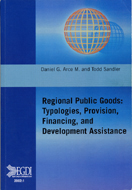 Regional
Public Goods: Typologies, Provision, Financing, and Development Assistance
with Daniel Arce
Regional
Public Goods: Typologies, Provision, Financing, and Development Assistance
with Daniel Arce
Pollution, disease, and armed conflicts are examples of problems whose
consequences often cross borders. How to combat such ills, especially
in poor countries, has in recent years been intensely debated in terms
of promoting global public goods.
This study contributes to the debate through its focus on regional
public goods (RPGs), a focus that has received much less attention than
the provision of public goods at the global level. Through the means
of typology, Daniel G. Arce M. and Todd Sandler identify several classes
of RPGs. The incentives to efficiently provide a public good depend
on the good's class. Some RPGs can be efficiently provided with little
public intervention while others pose real public policy concerns.
The financing of RPGs for development and povery reduction is addressed.
The authors emphasize that the funds for RPGs for development are limited.
At the same time, many RPGs, relating to important areas like the environment
and health, are particularly suitable for provision at the regional
level. Donors should therefore give more support to regional institutions.
Under certain conditions, these donors should also pursue partnerships
with actors such as private companies and nongovernmental organizations.
Networks and other institutional arrangements are discussed.
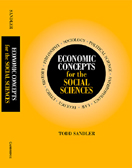 Economic
Concepts for the Social Sciences
Economic
Concepts for the Social Sciences
The primary purpose of this book is to present some of the key economic
concepts that have guided economic thinking in the last century and
to identify which of these concepts will continue to direct economic
thought in the coming decades. This book is written in an accessible
manner and is intended for a wide audience with little or no formal
training in economics. It should also interest economists who want to
reflect on the direction of the discipline and learn concepts and achievements
in other subfields. The author imparts his enthusiasm for the economic
way of reasoning and its wide applicability. Through the abundant use
of illustrations and examples, the author makes concepts understandable
and relevant. Topics covered include game theory, the new institutional
economics, market failures, asymmetric information, endogenous growth
theory, general equilibrium, rational expectations, and others.
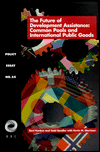 The Future
of Development Assistance: Common Pools and International Public Goods
with Ravi Kanbur and Kevin M. Morrison
The Future
of Development Assistance: Common Pools and International Public Goods
with Ravi Kanbur and Kevin M. Morrison
Development assistance is beset by two challenges: its past ineffectivennes
in achieving the ojectives of development an dpoverty reduction, and
the emergence of a range of transnational problems affecting both developed
and developing countries. How can aid be delid more efectively? And
how can it assist in international public goods which solve transnational
problems? In this essay, the authors propose a twofold framework to
guide development assistance: and approach to country-focused aid that
would minimize coordination difficulties and enhance recipient country
ownership, and a nuanced scheme for the provision of international public
goods.
 The Political
Economy of NATO with Keith Hartley
The Political
Economy of NATO with Keith Hartley
Using simple economic methods while accounting for political and institutional
factors, this book puts forward a political economy viewpoint of NATO's
current status and its future prospects. A balanced picture of NATO
is presented that is sensitive to the perspectives from both sides of
the Atlantic. This is accomplished by accounting for the institutional
features and the philsophical aspects that distinguish government decision
makers and the defense establishment in North America from their counterparts
in Europe. A host of NATO policy concerns are addressed, including th
eoptimal membership for the alliance, its role in peacekeeping missions
worldwide, the appropriate methods for deterring terrorism, and proper
procurement practices for the next generation of weapons. Additional
topics concern defense burden sharing, arms trade, NATO's institutional
structure, and NATO's role vis-à-vis other international organizations.
Although the analysis is rigorous, the book is intended for a wide audience
drawn from political science and economics.
 Global
Challenges
Global
Challenges
Using simple economic reasongin, this book analyzes a broad range of
global challencluding obal warming, ozone shield depletion, acid rain,
nuclear waste disposal, revolution dispersion, international terrorism,
disease eradiction, poppulation growth, tropical deforestation, and
peacemaking. These challenges are put into perspective in terms of scientific,
economic, and political considerations. Many of the problems are shown
to be solvable of reduceable without much explicit coordination among
nations. Although there is no single panacea for the challenges, much
can be done to tailor solutions. This book is intended for a wide audience
drawn from the social and policy sciences, including economics, environmental
studies, political science, sociology, and public policy. It should
also interest the general reader who wants to learn about global challenges.
 The
Theory of Externalities, Public Goods and Club Goods with Richard
Cornes
The
Theory of Externalities, Public Goods and Club Goods with Richard
Cornes
This book presents a theoretical treatment of externalities (i.e., uncompensated
interdependencies), public goods, and club goods. The new edition updates
and expands the discussion of externalities and their implications,
coverage of asymmetric information, underlying game-theoretic formulations,
and intuitive and graphic presentations. Aimed at well prepared undergraduates
and graduate students making a serious foray into this branch of economics,
the analysis should interest professional economists wishing to survey
recent advances in the field. No other single source for the range of
materials explored is currently available. Topics investigated include
Nash equilibrium, Lindahl equilibria club theory, the preference-revelation
mechanishm, Pigouvian taxes, the commons, the Coase Theorem, and static
and repeated games.
 The Economics
of Defense with Keith Hartley
The Economics
of Defense with Keith Hartley
The economics of defense provides a comprehensive evaluation of the
literature in an up-to-date, unified survey. The authors apply both
microeconomic and macroeconomic methods of analysis, including static
opitimization, growth theory, dynamic optimization, comparative statics,
game theory, and econometrics. The book includes chapters on the study
of arms races, alliances and burden sharing, economic warfare, the arms
trade, weapon procurement policies, defense and development, defense
industries, arms control agreements, disarmament, and conversion.
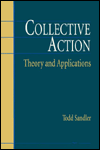 Collective
Action
Collective
Action
In Collective Action Todd Sandler synthesizes what has been learned
about collective action since the 1965 publication of the groundbreaking
study The Logic of Collective Action by Mancur Olson. Examining the
validity of Olsonian themes and propositions through a wealth of examples
drawn from a variety of fields, Professor Sandler explains the forces
behind collective action successes and failures. He concludes that while
none of Olson's propositions is true in general, most are valid in many
cases that correspond to important real-world scenarios.